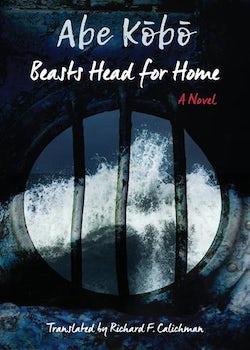Beasts Head for Home

By Abe Kobo
Translated by Richard F. Calichman
Columbia University Press, 2017
ISBN-13: 978-0231177054
Review by David Boyd
Abe Kobo (1924-1993) often set his stories in worlds without names or history. Yet, as translator Richard F. Calichman notes, Beasts Head for Home (1957; trans. 2017) makes fuller use of its setting than most of the writer’s work. The short novel takes place in war-torn Manchuria a couple of years after the collapse of the Japanese Empire – a significant moment for Abe, who grew up in Mukden (present-day Shenyang).
Kuki Kyuzo, the story’s teenage male protagonist, is still in Manchuria, despite the fact that the vast majority of Japanese settlers have already been repatriated. At the outset of the novel, he’s living among a group of Soviet officers, but soon escapes, bringing only a few stolen necessities: food, matches, vodka.
Kyuzo heads for Japan, a homeland he’s never known.
Everything he’s learned about Japan – ‘a smiling island of green surrounded by the sea, where the wind was gentle, birds sang, and fish swam’ – came from ‘textbooks at school’.
The path from Manchuria to Japan is treacherous, and survival is far from guaranteed. Every step forward presents another mortal danger, be it natural, animal or human. Kyuzo’s only company for most of the journey is a stranger whose name and identity are constantly in flux. At various stages in the story, the inscrutable character attempts to pass as Chinese, Korean and Japanese. He even tries passing as Kyuzo.
While the two continue their hellish trek together, Kyuzo cannot completely trust the nameless man (I will call him ‘Ko’, one of his aliases). For his part, Ko trusts no one. As he sees it, the wilderness they are attempting to cross is extremely ‘dangerous’ because of its betweenness:
‘We’re still at the border between friend and enemy. When all is said and done, I think the most dangerous thing is a border. They’re more dangerous than being in the midst of enemies… The next town is Shuanggang. That’s also on the border. The towns after that, Kaitong, Bianzhao, Tanyu, Taipingchuan, as well as the towns thereafter, are all on the border. In times such as these, the border definitely expands’.
Yet Ko himself is no less dangerous than the surrounding wilderness. He is a border in human form, committed to a given identity only to the extent that it furthers his chances of survival. For the callow Kyuzo, on the other hand, national identity is an immutable reality. With time, however, Kyuzo begins to see ‘Japan’ differently.
After leaving the Soviet camp, Kyuzo crosses paths with several people who read or speak Japanese fluently. In each instance, he asks expectantly: ‘Are you Japanese?’ Invariably, the answer is ‘No’. Near the end of his journey, Kyuzo finally finds himself in Japanese company, but this ethnic community is not the one promised in his textbooks. As he comes closer to Japan than ever before, Kyuzo begins to let go of his dreams of Japan:
‘Perhaps Japan doesn’t exist anywhere. With every step I take, the wasteland walks together with me. Japan just flees further away…’
While this early work differs from Abe’s better-known novels in some significant ways, Beasts Head for Home is unmistakably his. Calichman’s masterful translation is recommended reading for the uninitiated reader and diehard Abe fan alike.

